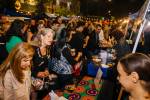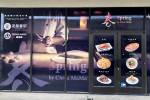SLOW DOWN
No, it has nothing to do with crockpots, not by definition, anyway. Think of slow food as the antithesis of fast food, and the Slow Food Movement as the antidote to the proliferation of fast-food outlets in the United States and throughout the world -- and everything that that connotes not only for the way we eat but for the way we live and our very cultures.
In fact, a rebellion against fast food is how the movement got its start. It might sound apocryphal, but Las Vegas resident Giovanni Mauro confirms the truth: Carlo Petrini, who lived in Rome near the Spanish Steps, looked out his window one day in 1986 and noticed a McDonald's going up in the neighborhood. And he declared, Mauro said, something in Italian that translates to the equivalent of "no more fast food; we're gonna have slow food."
A movement was born. Today, it's creeping into the Las Vegas Valley. And it has a particular allure.
From the philosophy statement of Slow Food International:
"We believe that everyone has a fundamental right to pleasure and consequently the responsibility to protect the heritage of food, tradition and culture that make this pleasure possible. ... Slow Food is good, clean and fair food."
And from Slow Food USA:
"Ultimately, it is about pleasure and taste, knowledge and choice. Slow food is also simply about taking the time to slow down and enjoy life with family and friends. Every day can be enriched by doing something slow -- making pasta from scratch one night, seductively squeezing your own orange juice from the fresh fruit, lingering over a glass of wine and a slice of cheese -- even deciding to eat lunch sitting down instead of standing up."
It's an idea whose time seems to have come in Las Vegas. During the past 15 years or so, the community has honed a greater appreciation for the thoughtful selection and preparation of foods. Some three years ago, members of the board of Slow Food USA tried to start a chapter -- properly called a convivium, for conviviality -- in Las Vegas, Mauro said, but "it just didn't mesh. It was a time issue" -- somewhat of an irony, considering the movement's mission. "The interest was there."
Enter Angelo Daprano, Ruth Sundback and William Wypyski, who along with Mauro are among the founding members of the Las Vegas convivium. Time isn't as much of an issue for them.
"That's something that Angelo and Ruth and I bring to the table," Wypyski said. "We're all retired."
He became involved because of Daprano, a neighbor whom Wypyski calls "a unique individual." Daprano, he said, is a retired orthodontist who's an "Italophile," making regular trips to Italy. During a language-immersion program of several months' duration, he learned about the movement and wanted to bring it to Las Vegas. Wypyski contacted the offices of Slow Food USA in Brooklyn, N.Y., in October and the convivium began to materialize. Official approval came just last week.
"It's a great concept," Wypyski said. "We all run too fast in life."
The other founding member is Bob Morris, a horticulture specialist with the University of Nevada Cooperative Extension. Morris' awareness was piqued when a film crew did a segment at the university's experimental orchard in North Las Vegas and the chefs involved in the show expressed interest in the orchard's products. Morris' involvement is in keeping with his interest in developing crops that can be grown locally, promoting local producers and facilitating contact between them and interested chefs.
"People who are supporting Slow Food want food that's local, high-quality and fresh," Morris said. The philosophy has to do with "being connected to the earth -- stuff we've always been doing at the orchard. We need to get the consumer to understand that," he added.
Mauro, co-owner with his brother, Marcello, of Nora's Wine Bar & Osteria and Nora's Italian Cuisine, said his role in furthering the philosophy that started in his native Italy has much to do with working with suppliers and fellow chefs and restaurateurs. Mauro has, for example, pledged to use quinces, persimmons and Pink Lady apples produced at the research orchard.
"It's an eclectic group," Wypyski said. "We fill in the gaps for one another."
But how, exactly, will they advance the slow-food movement here? By raising awareness, Mauro said, in the interest of raising quality of life and promoting biodiversity.
Twelve seminars are being planned. A program on olive oil is to be scheduled near the end of the month. For information, call 257-5509 or e-mail info@slowfoodlv.org.
"We need to get the consumer to understand that not everything needs to be imported to Nevada," Morris said.
They're also working on a Web site that will connect chefs and producers -- "like a Craig's List of produce," Mauro quipped.
One thing is certain, Mauro said: "We've got a mammoth project."
"It's important because food, culture and biodiversity is as much a part of our heritage as having different eye color," he said. "To lose that, we lose our identity as human beings."
Contact reporter Heidi Knapp Rinella at hrinella@reviewjournal.com or (702) 383-0474.























